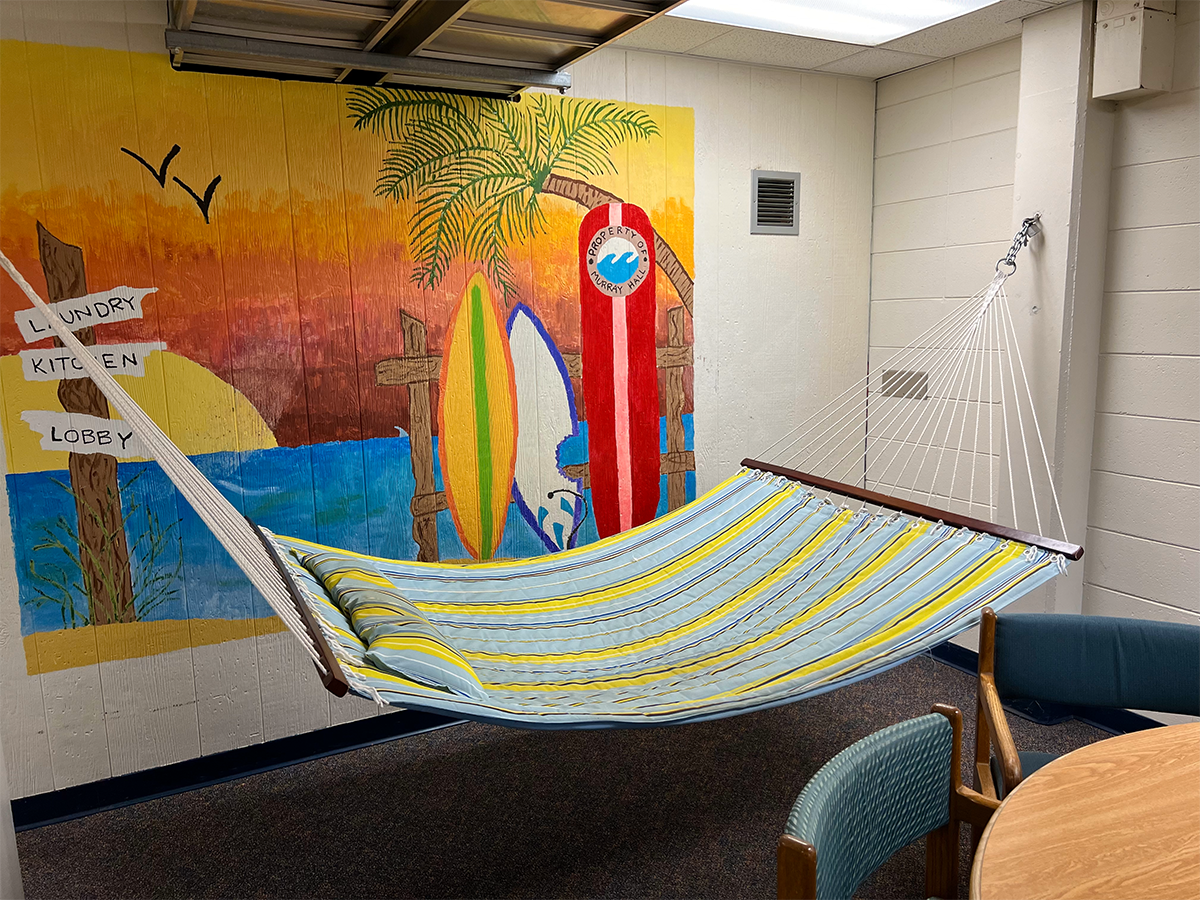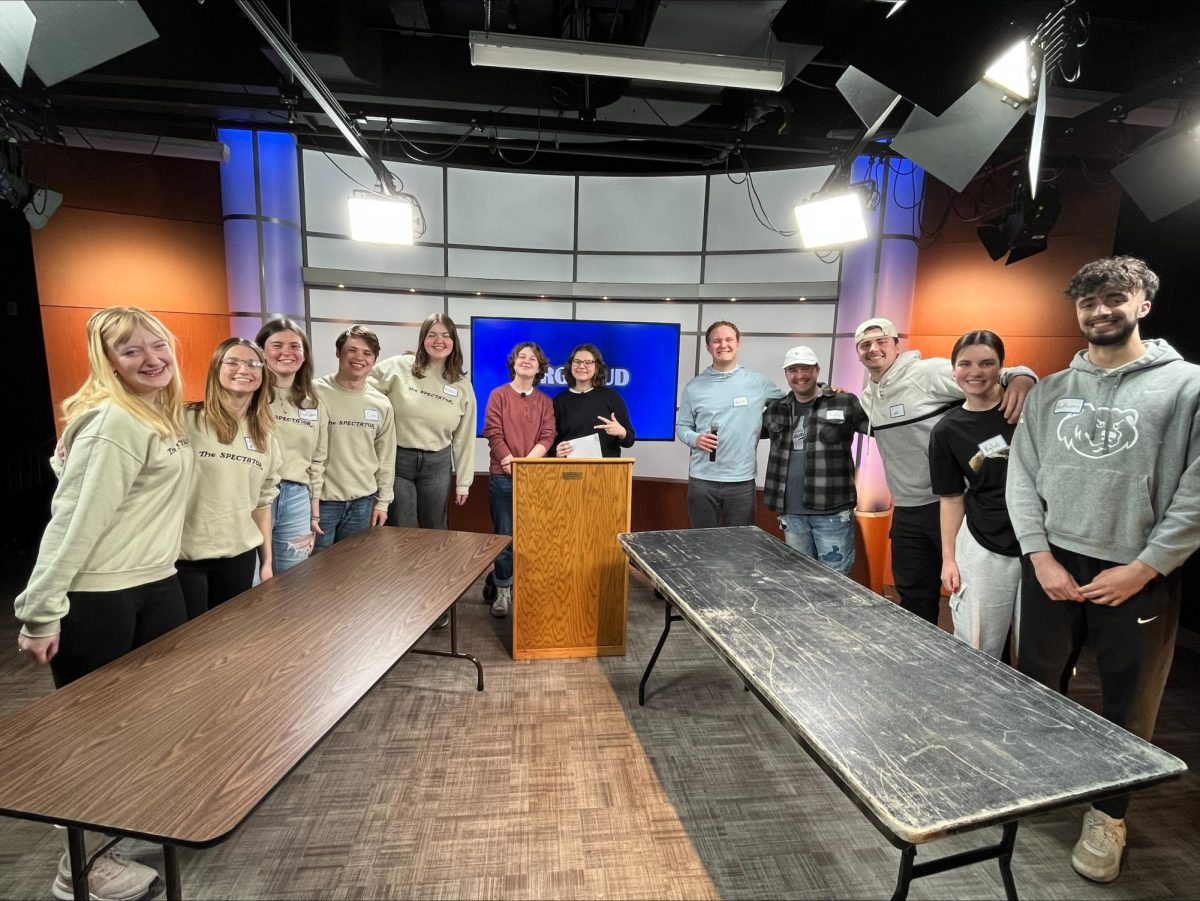
Editor’s note: This is a satirical article and is not meant to be taken seriously. It does not reflect the opinions of The Spectator or UW-Eau Claire.
Tuesday evening, I was lounging in my room contemplating ideas for my next Tator, when my phone buzzed.
I snapped out of my daze and reached for my phone. It was a text from Managing Editor Kaddie Masper.
“We need you, Kyra. Eau Claire needs you,” it read.
Last Tuesday at midnight the skies turned black — solid black, with not a speck of blue left in the sky — and released a thick, black rain.
Students poured out of their residence halls and apartments to investigate, and that was the last time they were seen.
The students disappeared. Vanished. Evaporated.
I didn’t anticipate taking on another investigative journalism so soon, but as chief copy editor, I refused to abandon my duty.
I put on my rain poncho and headed out into the night.
I went straight for the archives and began sifting through the fragile, dusty books.
I jumped nearly a foot when I saw two familiar eyes staring at me. It was last year’s Editor-in-Chief Spam Johnson.
“You shouldn’t be here,” he said. “It’s not safe for you.”
“I know the rain is dangerous,” I said. “But the people deserve the truth.”
“It’s not just the rain,” Johnson said. “There’s a presence here, covering Eau Claire. I’m safe as an alumnus, but if you aren’t careful, it’ll take you, too.”
Johnson pulled a massive, faded book off of the shelf. It was so worn, the cover was barely attached, but as he walked around the shelf toward me, I could just make out the formerly golden letters on the front: “BYLAWS.”
“This is the original book written by the UW-Eau Claire founders,” Johnson said. “If this doesn’t have the information we need to reverse the rain, I don’t know what will.”
We both looked down at the book, then back up at each other.
“I’ve graduated. As much as I want to be the one to crack this case, it’s no longer my place,” Johnson said. “It is your time now.”
I reached toward the book, my hand trembling. As my fingertips grazed the cover, I felt a shock shoot through my body.
I flipped past the table of contents to a page close to the back. Somehow I knew what I was looking for would be there, as if the book had whispered in my ear.
Halfway down the page, I saw it: a section titled, “The Rain.” I squinted down at the tiny print.
“Every 100 years, from midnight a week before Halloween until the clock strikes midnight on Nov. 1, the skies of Eau Claire will birth a black rain,” the book said. “This rain absorbs any student who ventures into it.”
My eyes widened. I knew there was something magical about the rain, but I never could’ve imagined the extent.
“The rain will disappear without a trace,” the book continued. “Leaving citizens of Eau Claire with no memory of it or the students it stole, as if they never existed at all.”
I traced my finger down the page, feeling a vibration like a soft hum that, as I neared the bottom of the page, got louder until I turned the page and a shriek tore through my head.
I stumbled backward into a bookshelf. I looked up at Johnson, unsure what was happening.
“You’ve unearthed the presence, Kyra,” he said, his voice shaking. “Many carry the power of the sword, but few carry the power of the pen. You have been chosen.”
I pulled myself up slowly. I looked down at the book, and that’s when I saw it.
“THE PRESENCE,” was printed at the top of the page in dark, bold lettering that didn’t match the tiny, faded print filling the rest of the book
I lowered my eyes to the paragraph below and read, “The Chippewa River is not just a landform, but a being. To reverse the curse, you must appeal to the river. To appeal to the river, you must become one with it.”
As I met Johnson’s eyes, neither of us spoke, but a melancholy understanding passed between us.
I dashed out of the library and walked toward Putnam Rock.
Despite what I knew I was about to do, I felt an odd sense of calm. I had a purpose. My semesters of working for The Spectator had prepared me for this.
I walked out onto the rock and turned my gaze toward the Chippewa.
I peeled off my poncho. I knew the rain wouldn’t absorb me like it did the others. The river and I had an understanding. A reverent agreement.
To free the students, it needed a sacrifice.
I walked to the edge, turned around and let myself fall back into the water. I felt the waves surround me, but instead of the cold I’d anticipated, the water captured me in a warm hug.
I had assumed that would be it for me. A quick death to appease the river. But there I was, alive, embraced by the current.
I felt a rumble, then heard a voice. I couldn’t tell if it was a sound or just a feeling, but it was tangible. Some sort of psychedelic force.
“Kyra,” it said to me. “Tell my story and I’ll set Eau Claire free.”
The words echoed through my body, then I was once again surrounded by darkness, the warmth gone completely.
I opened my eyes to find my apartment surrounding me.
I glanced at the clock, and the time hadn’t moved forward even a minute from when I had first stepped out my front door. My previously dripping wet poncho was hung by the door, completely dry.
I opened my laptop and the story flooded onto the page in front of me.
The moment I finished documenting the words the river transcribed to me, my phone buzzed.
It was Masper.
“I have a cold, it must be making me delirious,” Masper said. “I have no clue what that last text was about.”
I looked out the window behind my couch. It was still raining, but the water was clear, and the sky was a beautiful, deep blue.
“You may not,” I texted back. “But I have a story for you.”
Price can be reached at [email protected].












